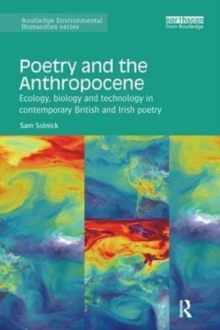Description
| Product ID: | 9781138597457 |
| Product Form: | Paperback / softback |
| Country of Manufacture: | GB |
| Series: | Routledge Environmental Humanities |
| Title: | Poetry and the Anthropocene |
| Subtitle: | Ecology, biology and technology in contemporary British and Irish poetry |
| Authors: | Author: Sam Solnick |
| Page Count: | 224 |
| Subjects: | Poetry, Poetry, Literary studies: general, Philosophy, Ethics and moral philosophy, Politics and government, Development economics and emerging economies, Environmental policy and protocols, Sustainability, Environmental science, engineering and technology, Literary studies: general, Philosophy, Ethics & moral philosophy, Politics & government, Development economics & emerging economies, Environmental policy & protocols, Sustainability, Environmental science, engineering & technology |
| Description: | Select Guide Rating This book asks what it means to write poetry in and about the Anthropocene, the name given to a geological epoch where humans have a global ecological impact. Combining critical approaches such as ecocriticism and posthumanism with close reading and archival research, it argues that the Anthropocene requires poetry and the humanities to find new ways of thinking about unfamiliar spatial and temporal scales, about how we approach the metaphors and discourses of the sciences, and about the role of those processes and materials that confound humans’ attempts to control or even conceptualise them. Poetry and the Anthropocene draws on the work of a series of poets from across the political and poetic spectrum, analysing how understandings of technology shape literature about place, evolution and the tradition of writing about what still gets called Nature. The book explores how writers’ understanding of sciences such as climatology or biochemistry might shape their poetry’s form, and how literature can respond to environmental crises without descending into agitprop, self-righteousness or apocalyptic cynicism. In the face of the Anthropocene’s radical challenges to ethics, aesthetics and politics, the book shows how poetry offers significant ways of interrogating and rendering the complex relationships between organisms and their environments in a world increasingly marked by technology. This book asks what it means to write poetry in and about the Anthropocene, the name given to a geological epoch where humans have a global ecological impact. Combining critical approaches such as ecocriticism and posthumanism with close reading and archival research, it argues that the Anthropocene requires poetry and the humanities to find new ways of thinking about unfamiliar spatial and temporal scales, about how we approach the metaphors and discourses of the sciences, and about the role of those processes and materials that confound humans’ attempts to control or even conceptualise them. Poetry and the Anthropocene draws on the work of a series of poets from across the political and poetic spectrum, analysing how understandings of technology shape literature about place, evolution and the tradition of writing about what still gets called Nature. The book explores how writers’ understanding of sciences such as climatology or biochemistry might shape their poetry’s form, and how literature can respond to environmental crises without descending into agitprop, self-righteousness or apocalyptic cynicism. In the face of the Anthropocene’s radical challenges to ethics, aesthetics and politics, the book shows how poetry offers significant ways of interrogating and rendering the complex relationships between organisms and their environments in a world increasingly marked by technology. |
| Imprint Name: | Routledge |
| Publisher Name: | Taylor & Francis Ltd |
| Country of Publication: | GB |
| Publishing Date: | 2018-04-25 |


